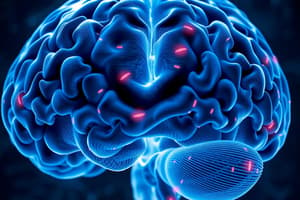Podcast
Questions and Answers
Which of the following is NOT typically associated with delirium?
Which of the following is NOT typically associated with delirium?
- Disturbance in attention
- Poor recall
- Prolonged gradual decline (correct)
- Abrupt onset
What is a common feature of major neurocognitive disorders?
What is a common feature of major neurocognitive disorders?
- Excellent memory retention
- Complete independence in daily activities
- Difficulty with problem solving (correct)
- Change in consciousness
Which term refers to false sensory stimuli that may lead an individual to feel bugs crawling on them?
Which term refers to false sensory stimuli that may lead an individual to feel bugs crawling on them?
- Confusion
- Delusion
- Hallucination (correct)
- Illusion
In which condition does cognitive function progressively deteriorate without a change in consciousness?
In which condition does cognitive function progressively deteriorate without a change in consciousness?
Which factor is NOT a physiological cause of delirium?
Which factor is NOT a physiological cause of delirium?
What does a mild neurocognitive disorder typically NOT interfere with?
What does a mild neurocognitive disorder typically NOT interfere with?
Which of the following symptoms would most likely indicate a pre-existing neurocognitive disorder rather than an acute condition like delirium?
Which of the following symptoms would most likely indicate a pre-existing neurocognitive disorder rather than an acute condition like delirium?
What is a potential treatment for cognitive symptoms in dementia patients?
What is a potential treatment for cognitive symptoms in dementia patients?
Which stage is NOT part of Kubler-Ross's 5 Stages of Grief?
Which stage is NOT part of Kubler-Ross's 5 Stages of Grief?
What type of therapy includes the use of Omega-3 fatty acids?
What type of therapy includes the use of Omega-3 fatty acids?
What is encouraged to help patients with dementia during palliative care?
What is encouraged to help patients with dementia during palliative care?
Which medication carries a high risk when used for behavioral symptoms in dementia?
Which medication carries a high risk when used for behavioral symptoms in dementia?
What is anticipatory grief?
What is anticipatory grief?
Which approach involves asking open-ended questions to foster connections?
Which approach involves asking open-ended questions to foster connections?
What does the term 'bereavement' specifically refer to?
What does the term 'bereavement' specifically refer to?
Which cognitive function is often assessed when evaluating memory impairment?
Which cognitive function is often assessed when evaluating memory impairment?
What is a key symptom of dementia that significantly interferes with daily activities?
What is a key symptom of dementia that significantly interferes with daily activities?
What type of degeneration is associated with significant memory loss and cognitive decline?
What type of degeneration is associated with significant memory loss and cognitive decline?
Which cognitive disturbance involves the inability to recognize familiar objects?
Which cognitive disturbance involves the inability to recognize familiar objects?
What phenomenon describes the creation of stories to fill in memory gaps?
What phenomenon describes the creation of stories to fill in memory gaps?
Which condition is marked by the repetitive use of phrases or gestures after the stimulus has ceased?
Which condition is marked by the repetitive use of phrases or gestures after the stimulus has ceased?
What term describes the tendency to put objects in one's mouth regardless of their nature?
What term describes the tendency to put objects in one's mouth regardless of their nature?
What type of memory loss is specifically categorized as severe forgetting of previously known information?
What type of memory loss is specifically categorized as severe forgetting of previously known information?
Which of the following is NOT considered a cognitive disturbance in dementia?
Which of the following is NOT considered a cognitive disturbance in dementia?
What is the phenomenon where a person experiences increased agitation in the evening?
What is the phenomenon where a person experiences increased agitation in the evening?
Flashcards are hidden until you start studying
Study Notes
Neurocognitive Disorders
- Delirium:
- Characterized by: Disturbance in attention, abrupt onset, periods of lucidity, disorganized thinking, disorientation, anxiety, agitation, poor recall, and delusions/hallucinations.
- Caused by: Multifactorial physiological causes such as cognitive impairment, immobilization, psychoactive medications, dehydration, infection, and sleep deprivation.
- Nursing Process:
- Assess cognitive and perceptual disturbances.
- Assess for illusions (errors in perception) and hallucinations (false sensory stimuli).
- Do not assume confusion is dementia, especially in older patients.
- Utilize ADPIE (Assessment, Diagnosis, Planning, Implementation, Evaluation).
- Minor Neurocognitive Disorders:
- Characterized by: Progressive deterioration of cognitive function and global impairment of intellect (dementia).
- Key Difference from Major: No change in consciousness.
- Difficulty with memory, problem-solving, complex attention.
- Mild: Does not interfere with ADLs and does not necessarily progress.
- Major: Interferes with daily functioning and independence.
Major Neurocognitive Disorders
- Types:
- Alzheimer's Disease
- Frontotemporal Lobar Degeneration
- Lewy Body Disease
- Parkinson's Disease
- Traumatic Brain Injury
- Cerebrovascular Disease
Alzheimer's Disease
- Important: Distinguish normal forgetfulness from memory deficits in dementia.
- Progression: All progress through mild, moderate, and severe stages.
- Symptoms:
- Memory impairment
- Disturbances in executive functioning.
- Aphasia (loss of language ability), including anomia (difficulty with word retrieval).
- Apraxia (loss of purposeful movement).
- Agnosia (loss of sensory ability to recognize objects).
- Amnesia (memory loss).
- Risk Factors: Late onset, most common in females. Modifiable Risk Factors: Diet, cardiovascular health, head injury, social engagement.
Nursing Process: Alzheimer's Disease
- Confabulation: Creation of stories to fill in missing memories.
- Perseveration: Repetition of phrases or gestures long after the stimulus is gone.
- Agraphia: Diminished ability to read or write.
- Hyperorality: Tendency to put everything in the mouth.
- Sundowning/Sundown Syndrome: Tendency for agitation to rise as the light of day leaves.
Nursing Assessment: Alzheimer's Disease
- Assess for: Memory impairment, disturbances in executive functioning (problem solving, planning, abstract thinking), and diminished emotional responsiveness.
- Tests:
- Mental Status Exam (MSE)
- Neuro exam
- Review medications and nutrition.
Treatment Modalities for Alzheimer's Disease
- Pharmacotherapy:
- Medications for cognitive symptoms:
- Cholinesterase inhibitors (e.g., Donepezil, Rivastigmine, Galantamine).
- N-methyl-D-aspartate (NMDA) receptor antagonist (e.g., Memantine).
- Medications for behavioral symptoms (last resort):
- Antipsychotics used off-label and with extreme caution (high risk).
- Medications for cognitive symptoms:
- Integrative Therapy:
- Omega-3 fatty acids
- Diet
Dying, Death, and Grieving
- Kubler-Ross's 5 Stages of Grief:
- Denial/Isolation
- Anger
- Bargaining
- Depression
- Acceptance.
- Practice the Art of Presence: Ask open-ended questions.
- Anticipatory Grief: Mourning a future loss in advance.
- Adjusting life around the limited time remaining.
- Foreseeing how the future will be.
- Anger is a common component.
Palliative Care for Patients with Dementia
- Key Aims: Anticipate needs, encourage meaningful connections with loved ones, identify patient goals for care, and educate family to minimize aggression during care.
- Important: manage pain and depression.
- Developmental Tasks of Dying: Things people want to get done before their death.
Grief
- Definition: A reaction to a loss.
- Bereavement: The grieving period after a death.
- Mourning: Activities people use to cope with grief.
- Grief versus Major Depressive Disorder:
- Grief: Intense sadness and anger that occurs in waves and gradually subsides. Focus on the deceased, thoughts of reuniting someday, self-esteem remains intact.
- Major Depressive Disorder: Feelings of worthlessness, self-loathing, focus on ending pain, thoughts of death, possible development of a plan for death.
Types of Grieving and Associated Nursing Care
- Complicated Grief: Prolonged grieving with reactive distress that can lead to impairments in relationships and occupational performance.
- Nursing Care:
- Begin with nursing diagnoses of "risk for dysfunctional grieving."
- Respond to grieving but protect individual.
- Assist as needed to maintain normal functioning.
- Nursing Care:
- Disenfranchised Grief: Grief experience not congruent with socially recognized relationships.
- Nursing Care: Provide support and guidance, consider virtual support, and psychotherapy.
- Grief Induced by Public Tragedy or Media:
- Nursing Care: Acknowledge and validate grief, encourage self-care.
Mental Health and Aging
- Late-Life Mental Illness:
- Major Depressive Disorder
- Suicide
- Anxiety Disorder
Studying That Suits You
Use AI to generate personalized quizzes and flashcards to suit your learning preferences.




